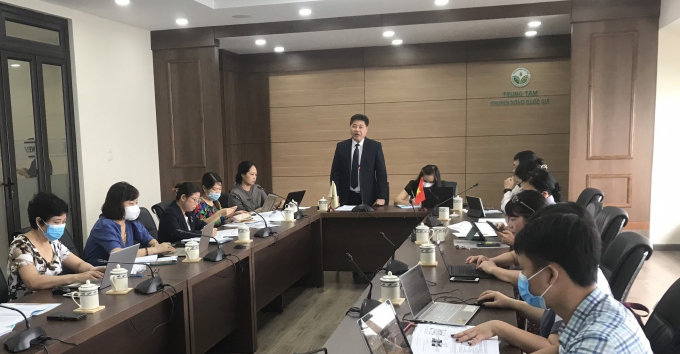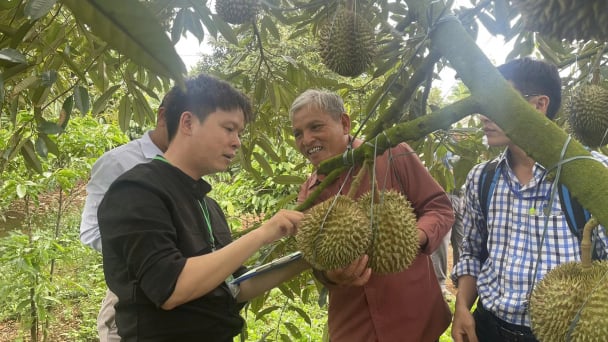May 31, 2025 | 14:29 GMT +7
May 31, 2025 | 14:29 GMT +7
Hotline: 0913.378.918
May 31, 2025 | 14:29 GMT +7
Hotline: 0913.378.918

Le Quoc Thanh, Director of the National Agricultural Extension Center (MARD) delivers a speech at the workshop.
The workshop was conducted on-site and online to complete the papers with guidelines for gender mainstreaming in agricultural extension for the training of trainers (ToT) within the cooperation framework of NAEC and UN Women in 2021.
The workshop gathered input from numerous representatives of NAEC departments, provincial agricultural extension centers, and related parties such as CARE, SNV, and OXFAM. These comments will serve as the foundation for the editorial team as they edit and complete the document to ensure that it meets all requirements, is of high quality, and is efficient.
Indeed, women have poorer access to input services and agricultural extension services than males in both agriculture and business. Women participate in agricultural extension activities at a somewhat lower rate than men, even though women constitute the primary labor force in agriculture, especially in the wake of men's migration out of rural regions and the agricultural sector. Additionally, the reality demonstrates gender disparity in agricultural extension. On the other hand, agricultural extension programs and activities have generally fallen short of meeting the requirements of rural women. Therefore, it is urgent to pay due attention to the gender aspect of agricultural extension to improve women's access to agricultural extension activities.
Existing laws have yet to provide explicit guidance on how to integrate gender into agricultural extension operations. Agricultural extension policies are primarily concerned with increasing agricultural extension services such as value chain linkage and technology transfer, without paying much attention to gender mainstreaming. This constraint results in the formation of gender barriers, denying women equal opportunity to benefit from sharing with males and, in particular, restricting women's ability for business activities.
For the reasons stated before, it is critical to develop a document outlining rules for gender mainstreaming in agricultural extension for local-level officials and to communicate about gender mainstreaming in agricultural extension.
Le Quoc Thanh, Director of the National Agricultural Extension Center (MARD), said that mainstreaming gender issues into agricultural extension operations would result in increased agricultural output efficiency. To help achieve this goal, the center collaborated with UN Women to create a set of documents on gender mainstreaming in education and plans to ensure that gender work is integrated into all agricultural extension activities, including model building, training and education, information and propaganda, and conference and seminar work.
“During the document's early stages of development, the center collaborated with UN Women and also asked the Women's Union, Farmers' Union, and other public groups to join forces in gender work. Following the creation of the document, the center will collaborate with industry organizations to organize conferences, seminars, and experimental teaching sessions to provide direct answers to extremely prevalent problems, with an emphasis on local outreach. Not only the agricultural extension center but also foreign and local organizations will engage in a synchronized way via this technique," Thanh said.

(VAN) For the durian industry to succeed, the value chain must fulfill its commitments to the government, the community, and international partners.

(VAN) Vaccinating juvenile pangasius helps reduce disease, antibiotic use, and farming costs, increasing profits for export-oriented farmers in An Giang.

(VAN) Due to a limited supply of workforce and competitive recruitment requirements, businesses struggle to retain talented veterinary human resources.

(VAN) WOAH’s guidance aims to mitigate disease risks through a One Health approach that balances economic, conservation, and public health interests.

(VAN) Ms. Nguyen Thi Dung, Deputy Director of Ngoc Hoang Cooperative, shared about the journey of bringing dragon fruit to Europe, achieving annual revenues in the billions of VND.

(VAN) Bamboo products from Thang Tho Bamboo Cooperative have reached many countries around the world, while also creating jobs for local workers.

(VAN) The Management Board of Con Dao National Park reported that a green sea turtle, tagged in the Philippines, has traveled thousands of kilometers to lay 84 eggs on Bay Canh Islet.